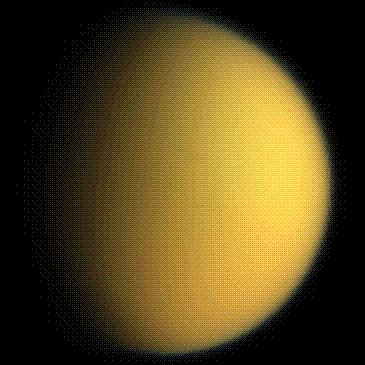The Surprising Contents of Titan’s Lakes
One of the exotic attractions of Saturn’s moon Titan is the possibility that it has oceans and lakes, with waves and breakers not unlike those on Earth. In the 1990s, astronomers ruled out the possibility of a global ocean using radar measurements taken from Earth but the possibility of lakes remained. And sure enough, in 2005, the Cassini spacecraft spotted a large lake-like feature called Ontario Lacus near the south pole and has since spotted numerous smaller ones.
So what are these lakes made of? The conventional thinking is that the lakes must be made of a mixture of liquid ethane, methane and nitrogen. However, the amount of methane in the atmosphere makes it difficult to see in liquid form at ground level and only liquid ethane has been directly spotted in Ontario Lacus.
The only other way to infer the composition of the lakes is by creating a thermodynamic model of the atmosphere using spacecraft and laboratory data and theoretical calculations. And of course, data from Cassini is revolutionising these calculations.
Today, Daniel Cordier from the Ecole Nationale Superieure de Chimie de Rennes, France, et amis, present the latest take on the data. Their number crunching reveals that:

That’s a rich and somewhat unexpected mix. But it’s also useful because it allows more detailed calculations about the role of liquid on the surface of Titan. “Our results provide the chemical data needed to compute the amount of deposition of various hydrocarbons and nitriles in fluvial valleys in the Titan’s midlatitudes,” says the team.
And that should allow planetary geologists to build and test a new generation of models that show how rivers and streams have carved the surface of Titan. Geologists will be waiting with baited breath. The differences as well as the similarities with the processes that occur on Earth should make fascinating reading.
Ref: http://arxiv.org/abs/0911.1860: An Estimate of the Chemical Composition of Titan’s Lakes
Keep Reading
Most Popular
Large language models can do jaw-dropping things. But nobody knows exactly why.
And that's a problem. Figuring it out is one of the biggest scientific puzzles of our time and a crucial step towards controlling more powerful future models.
How scientists traced a mysterious covid case back to six toilets
When wastewater surveillance turns into a hunt for a single infected individual, the ethics get tricky.
The problem with plug-in hybrids? Their drivers.
Plug-in hybrids are often sold as a transition to EVs, but new data from Europe shows we’re still underestimating the emissions they produce.
Stay connected
Get the latest updates from
MIT Technology Review
Discover special offers, top stories, upcoming events, and more.